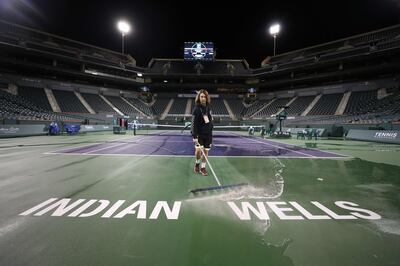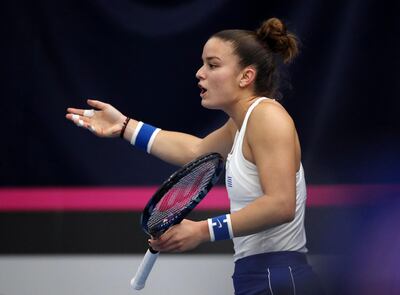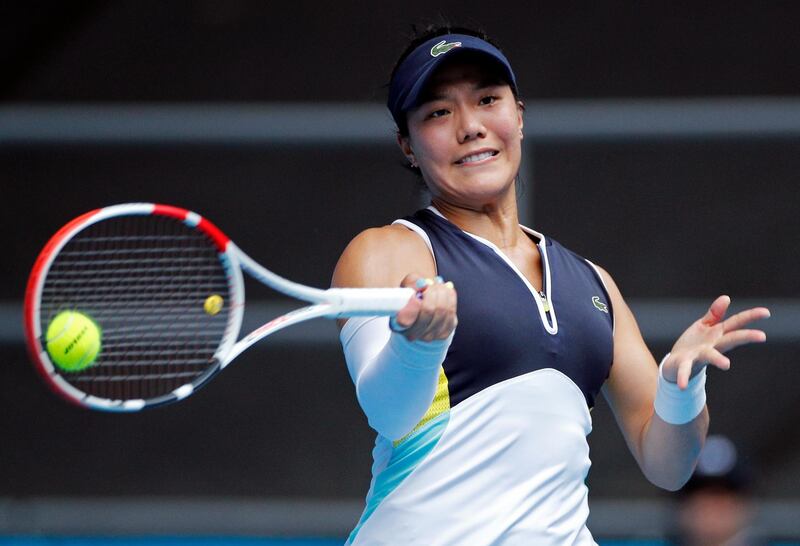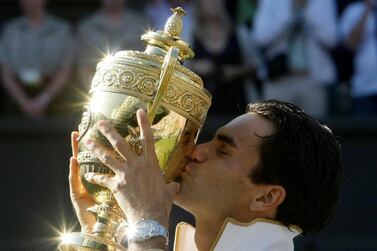When Kristie Ahn joined the WTA Player Council at the end of 2018, she had no idea that a little over a year later she would be working with the tour to try and help her fellow tennis players navigate a global pandemic and survive a lengthy hiatus.
The 27-year-old American, a TikTok genius ranked No 96 in the world, is part of the eight-person council that advocates player interest to the WTA, which is a governing partnership between players and tournaments. The ATP Tour follows a similar structure but its Player Council consists of 12 members – including Roger Federer, Rafael Nadal and council president Novak Djokovic.
Unlike many other athletes, tennis players are independent contractors that do not get a salary. Their income is based on prize money linked to their on-court performances, as well as endorsement deals (those who are lucky enough to have some).
During this current tour suspension due to the coronavirus, tennis players are effectively out of a job for at least four months – so far tournaments have been cancelled until July 13 – and those belonging to a lower ranking group have serious financial concerns with no revenue streams on the horizon.
A group effort
Ahn, and her fellow council members, have been busy going through weekly meetings, and daily WhatsApp group chats, searching for ways to raise funds to relieve some of the pressure weighing down on the players.
"We're trying to find a way to get as much money as quickly as possible to players who are in pretty dire situations," Ahn told The National in a phone interview.
“We know we’re headed in the right direction but we’re not only racing against the numbers, but also just time. Because the longer this decision takes, the more players are concerned about making it week to week, so definitely we’ve got two big factors.”
While Ahn wouldn’t reveal details, she believes there are “a couple of options” in the works that could result in some sort of relief fund for the players.
“Hopefully more than one option can go through,” she said.
As it is with anything in life, a time of crisis can bring to light underlying issues that had previously been concealed, or had not seemed pressing enough to address in the past.
Noah Rubin, a former Wimbledon junior champion who peaked at No 125 in the world in 2018, has been very vocal over the past 12 months about how harsh and unsustainable tennis can be for lower-ranked players and those attempting to break through.
“We go paycheck to paycheck, especially guys outside the top 50 in the world,” Rubin, 24, told Racquet magazine recently.
“There’s guys that are 200 in the world that, six months from now, are going to worry about how rent is going to be paid.
“I don’t think there’s any money reserved for players right now. I believe that budgeting is off in certain cases, I believe that they should be helping the players regardless of how this could impact some of the budgeting for the future.
“If you can’t protect the players right now, there’s no point for 2021.”
Financial struggles

It is unclear where the money for any sort of relief fund will come from. Tournaments are struggling to stay afloat – Ahn says Indian Wells lost $40 million (Dh147m) when it got cancelled last minute, which is a sum only a tournament of that size can survive – and the tours are not equipped for such a bailout.
In a statement sent out to The National, WTA CEO Steve Simon said: "We wish there was a way everyone, especially those in need the most, could be compensated at the level they were expecting, but the needs are so great and the WTA unfortunately is not in a financial position to do that."
Simon explains that the tour is working with tournaments to find out a way to maximise earning opportunities for the players when the tennis restarts, and is considering extending the 44-week season to allow more events to take place.
Call for union
Another main issue at the forefront of conversations right now is the big divide between the various governing bodies and stakeholders in tennis.
A call with US president Donald Trump on Saturday reportedly included sports commissioners and top executives from the NFL, NBA, Major League Baseball, NHL, Major League Soccer, WNBA, WWE, the PGA Tour, LPGA, UFC, NASCAR, IndyCar and Breeders' Cup.
A notable absentee was a representative from tennis, even though the women’s tour is headquartered in Florida and so is ATP Americas. It’s hard to have a voice at the table when your structure is this messy.
“It’s fine, tennis isn’t trying to restart its schedule in the States or anything. Maybe the ATP and ITF can stop playing solitaire long enough to provide tennis with a figurehead,” tweeted American tennis player Tennys Sandgren when news of the conference call came out.
It’s fine tennis isn’t trying to restart its schedule in the states or anything. Maybe the atp and itf can stop playing solitaire long enough to provide tennis with a figurehead https://t.co/UtD6F0g1mm
— Tennys Sandgren (@TennysSandgren) April 4, 2020
Now more than ever, tennis needs to unite, and this hiatus could pave the way for some serious restructuring, if the powers that be choose to prioritise it. The sport has gone from petty Davis Cup-v-ATP Cup infighting to facing a pandemic. If that doesn’t force a jolt of perspective, I don’t know what will.
Players seem to be willing to mobilise and finally form some sort of union that would represent their interests, although the varying union laws for each country remain a roadblock.
'Existential crisis'
Ahn says the WTA players are more focused on what can be done right now, rather than long-term plans, and mentions mental health as an important area to address.
“It’s a strange period of time for us right now because I think a lot of us have lost our sense of purpose,” she said.
“The last thing we want is having some sort of massive mental health crisis on the tour that we did nothing to address it.
"With Wimbledon's cancellation announcement [last Wednesday], it hit a little extra hard. We really made a push for the WTA to use their resources, their amazing staff, to reach out to players and be there for them.
“I swear every day in the shower I have like an existential crisis of like, ‘What am I doing? Why am I doing this? Is this something I want to keep doing?’
“Obviously it’s not just the downside, this is the worst side of sport, tennis actually, that you have no job security; there’s no work-from-home for us.
“We don’t know anything, it’s pretty much like we’ve been laid off for now until the WTA can turn up with a financial plan. Definitely it takes a toll mentally.”
Coaches also in a tight spot

Tennis coaches are also in a rough spot. Tom Hill, Maria Sakkari’s coach returned home to Birmingham a few days after Indian Wells was cancelled last month and has been keeping in touch with his charge every couple of days on WhatsApp, trying to keep her spirits up while she is in lockdown in Greece.
He says most coaches get paid per week, solely for the weeks they spend with their players, which means most of them are out of work at the moment. He notes that many coaches don’t even have contracts.
“I’d say most coaches are probably not getting any money right now. And I believe there will be a lot of coaches and players that split, and probably that’s going to be a lot to do with money if I’m honest. That won’t happen with Maria and I, but I think it’ll come out in the next few months,” the Briton said.
Everyone acknowledges that these are unprecedented and extreme circumstances. Still, it’s vital that we learn from this period and make necessary changes, not just to survive now, but with hopes to thrive again once we’ve moved passed this.
This pandemic has laid bare all of tennis’ baffling eccentricities. Time will tell if the sport comes out of this stronger and wiser.







